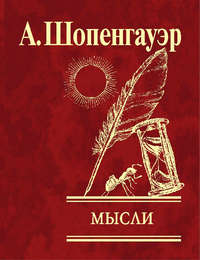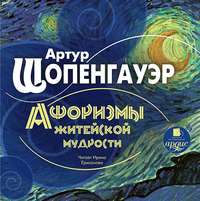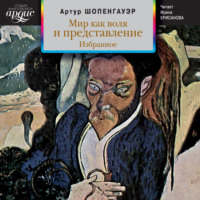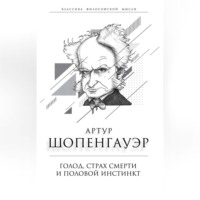 полная версия
полная версияThe World as Will and Idea (Vol. 2 of 3)
9
Kant said, “It is very absurd to expect enlightenment from reason, and yet to prescribe to her beforehand which side she must necessarily take” (“Critique of Pure Reason,” p. 747; V. 775). On the other hand, the following is the naive assertion of a professor of philosophy in our own time: “If a philosophy denies the reality of the fundamental ideas of Christianity, it is either false, or, even if true, it is yet useless.” That is to say, for professors of philosophy. It was the late Professor Bachmann who, in the Jena Litteraturzeitung for July 1840, No. 126, so indiscreetly blurted out the maxim of all his colleagues. However, it is worth noticing, as regards the characteristics of the University philosophy, how here the truth, if it will not suit and adapt itself, is shown the door without ceremony, with, “Be off, truth! we cannot make use of you. Do we owe you anything? Do you pay us? Then be off!”
10
By the way, Machiavelli's problem was the solution of the question how the prince, as a prince, was to keep himself on the throne in spite of internal and external enemies. His problem was thus by no means the ethical problem whether a prince, as a man, ought to will such things, but purely the political one how, if he so wills, he can carry it out. And the solution of this problem he gives just as one writes directions for playing chess, with which it would be folly to mix up the answer to the question whether from an ethical point of view it is advisable to play chess at all. To reproach Machiavelli with the immorality of his writing is just the same as to reproach a fencing-master because he does not begin his instructions with a moral lecture against murder and slaughter.
11
Although the conception of legal right is properly negative in opposition to that of wrong, which is the positive starting-point, yet the explanation of these conceptions must not on this account be entirely negative.
12
I specially recommend here the passage in Lichtenberg's “Miscellaneous Writings” (Göthingen, 1801, vol. ii. p. 12): “Euler says, in his letters upon various subjects in connection with natural science (vol. ii. p. 228), that it would thunder and lighten just as well if there were no man present whom the lightning might strike. It is a very common expression, but I must confess that it has never been easy for me completely to comprehend it. It always seems to me as if the conception being were something derived from our thought, and thus, if there are no longer any sentient and thinking creatures, then there is nothing more whatever.”
13
Lichtenberg says in his “Nachrichten und Bemerkungen von und über sich selbst” (Vermischte Schriften, Göttingen, 1800, vol. i. p. 43): “I am extremely sensitive to all noise, but it entirely loses its disagreeable character as soon as it is associated with a rational purpose.”
14
That the three-toed sloth has nine must be regarded as a mistake; yet Owen still states this, “Ostéologie Comp.,” p. 405.
15
This, however, does not excuse a professor of philosophy who, sitting in Kant's chair, expresses himself thus: “That mathematics as such contains arithmetic and geometry is correct. It is incorrect, however, to conceive arithmetic as the science of time, really for no other reason than to give a pendant (sic) to geometry as the science of space” (Rosenkranz in the “Deutschen Museum,” 1857, May 14, No. 20). This is the fruit of Hegelism. If the mind is once thoroughly debauched with its senseless jargon, serious Kantian philosophy will no longer enter it. The audacity to talk at random about what one does not understand has been inherited from the master, and one comes in the end to condemn without ceremony the fundamental teaching of a great genius in a tone of peremptory decision, just as if it were Hegelian foolery. We must not, however, fail to notice that these little people struggle to escape from the track of great thinkers. They would therefore have done better not to attack Kant, but to content themselves with giving their public full details about God, the soul, the actual freedom of the will, and whatever belongs to that sort of thing, and then to have indulged in a private luxury in their dark back-shop, the philosophical journal; there they may do whatever they like without constraint, for no one sees it.
16
This chapter, along with the one which follows it, is connected with § 8 and 9 of the first book.
17
Illgen's “Zeitschrift für Historische Theologie,” 1839, part i, p. 182.
18
Gall et Spurzheim, “Des Dispositions Innées,” 1811, p. 253.
19
This chapter is connected with § 12 of the first volume.
20
This chapter is connected with § 13 of the first volume.
21
This chapter and the one which follows it are connected with § 9 of the first volume.
22
This chapter is connected with the conclusion of § 9 of the first volume.
23
This chapter is connected with § 14 of the first volume.
24
A principal use of the study of the ancients is that it preserves us from verbosity; for the ancients always take pains to write concisely and pregnantly, and the error of almost all moderns is verbosity, which the most recent try to make up for by suppressing syllables and letters. Therefore we ought to pursue the study of the ancients all our life, although reducing the time devoted to it. The ancients knew that we ought not to write as we speak. The moderns, on the other hand, are not even ashamed to print lectures they have delivered.
25
This chapter is connected with § 15 of the first volume.
26
This chapter is connected with § 16 of the first volume.
27
This chapter is connected with § 15 of the first volume.
28
[Bayard Taylor's translation of Faust, vol. i. 180. Trs.]
29
This chapter is connected with § 18 of the first volume.
30
This chapter is connected with § 19 of the first volume.
31
It is remarkable that Augustine already knew this. In the fourteenth book, “De Civ. Dei,” c. 6, he speaks of the affectionibus animi, which in the preceding book he had brought under four categories, cupiditas, timor, lætitia, tristitia, and says: “Voluntas est quippe in omnibus, imo omnes nihil aliud, quam voluntates sunt: nam quid est cupiditas et lætitia, nisi voluntas in eorum consensionem, quæ volumus? et quid est metus atque tristitia, nisi voluntas in dissensionem ab his, quæ nolumus? cet.”
32
By those who place mind and learning above all other human qualities this man will be reckoned the greatest of his century. But by those who let virtue take precedence of everything else his memory can never be execrated enough. He was the cruelest of the citizens in persecuting, putting to death, and banishing.
33
The Times of 18th October 1845; from the Athenæum.
34
This chapter is connected with § 20 of the first volume.
35
Spallanzani, Risultati di esperienze sopra la riproduzione della testa nelle lumache terrestri: in the Memorie di matematica e fisica della Società Italiana, Tom. i. p. 581. Voltaire, Les colimaçons du révérend père l'escarbotier.
36
Cf. Ch. 22.
37
« Tout ce qui est relatif à l'entendement appartient à la vie animale, » dit Bichat, et jusque-là point de doute; « tout ce qui est relatif aux passions appartient à la vie organique, » – et ceci est absolument faux. Indeed! —decrevit Florentius magnus.









